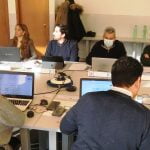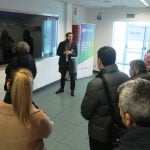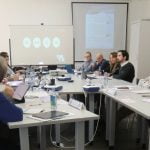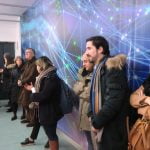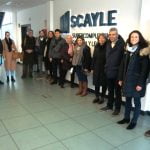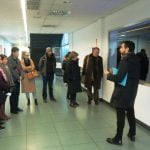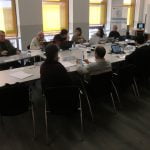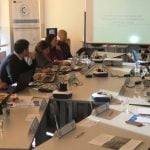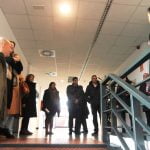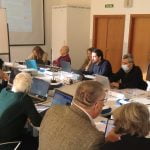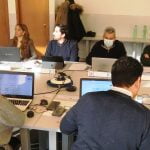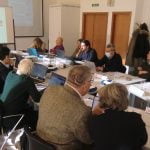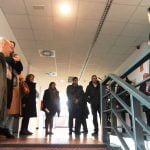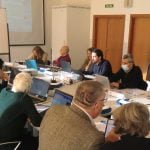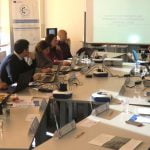The first face-to-face meeting, the second of the AIRES project, was held at the University of León (ULe) from January 30th and 31st to February 1st, 2023 Consortium members from the University of Sousse (Uso), the University of Cádiz (UCA) and the University of Trnava (UT) attended the event in person. In contrast, University of L’Aquila (UNIVAQ) members attended online.

Monday, January 30th, 2023:
Reception of Partners and Institutional Welcome from the University of León
As it appears in the event agenda, at 15:30 h, in the Assembly Hall of the School of Mining Engineering, the Workshop was inaugurated by the Rector of the University of León, Prof. Juan Francisco García Marín, and the Vice Rector of International Affairs of this university, Prof. Roberto Baelo. Then, a brief reception event was conducted, where the Rector of the University of León showed his support and interest in the project and gave the floor to the Vice-Rector of International Affairs, who described the resources of the University of León and its capacity to attend international students. Then, Prof. Olfa Bel Hadj Brahim from USO, as coordinator of the AIRES project, briefly described the project to introduce it to all present. Finally, Prof. Miguel de Simón Martín, from ULe, as PI of the project at this university, explained the program of the Workshop and its objectives.
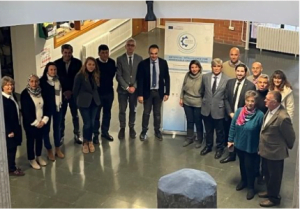
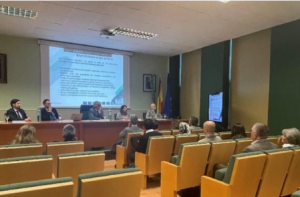
Figure 1. Reception of partners (left) and institutional welcome to the University of León (right).
The main objectives of the organised meeting were:
- Review and approval of deliverables D1.1, D1.2 and D1.3.
- Define the resources and infrastructure required for the project (D1.4).
- Develop the competency framework guidelines of the project (D1.5).
- Introduce the accreditation process, its general requirements and those specific to each country (D1.10).
- Define the organisation and general structure of the proposed degree.
- Mark the tasks to be carried out for the next meeting.
The academic agenda was completed with a visit to the historic centre of León, which served as a welcome to all participating partners and an opportunity to strengthen cultural ties.
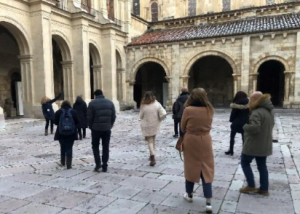
Figure 2. Tour around the downtown of León.
Tuesday, January 31st, 2023:
The first working session began on January 3rd, early in the morning. First, Prof. Miguel de Simón Martín (ULe) welcomed all the members and made an individual presentation of each one of them. Then, Prof. Olfa Bel Hadj Brahim (Uso), coordinator of the AIRES project, began to review deliverables D1.1, D1.2 and D1.3.
In the first of the deliverables, Prof. Miguel de Simón Martín (ULe) proposes slight changes in the composition of the different working committees affecting only members of ULe, which were accepted by all members, resulting in the composition as shown in Table 1:
Table 1. Final approved composition of all committees of the project.
| Committee | Composition |
| Steering Committee | – Olfa Bel Hadj Brahim (Uso) – Martin Rusnák (UT) – Sara Balderas (UCA) – Miguel de Simón Martín (ULe) – Carlo Cecati (UNIVAQ) |
| Academic Committee | – Mahmoud Hamouda (Uso) – Viera Rusnáková (UT) – Gabriel Guerrero (UCA) – Jorge Juan Blanes Peiró (ULe) – Concettina Buccella (UNIVAQ) |
| Accreditation and Quality Monitoring Committee | – Olfa Fakhfakh & Samya Sagar (Uso) – Patrik Sivčo (UT) – Alberto González Martínez & Ana María Diez Suárez (ULe) – Alessandro D’Innocenzo (UNIVAQ) – Gabriel Guerrero (UCA) |
| Communication and Dissemination Committee | – Hichem Romdhani & Hafedh Nouir (Uso) – Dominika Plančíková (UT) – Nuria González Rabanal & Álvaro de la Puente Gil (ULe) – Sobhan Mohamadian (UNIVAQ) – Sara Balderas (UCA) |
Then, it was revised deliverable D1.2, and after an exchange of opinions, the meeting schedule was modified at the request of Prof. Sara Balderas (UCA). After an exchange of opinions, the schedule shown in Table 2 is unanimously decided:
Table 2. Final meeting schedule.
| Meeting | Site | Celebration dates |
| 3 | Cádiz | May, 2023 |
| 4 | L’Aquila | July, 2023 |
| 5 | Sousse | October 2023 |
| 6 | Online Meeting | November, 2023 |
| 7 | Trnava | December, 2023 |
| 8 | Sousse | January, 2024 |
Finally, it was agreed to strengthen the project’s dissemination strategy by preparing a web page, thus approving deliverable D1.3 .
In the second session, Prof. Miguel de Simón Martín (ULe) took the floor to present the draft report on the hardware and software resources available for the project (deliverable D1.4), sent to the partners the previous week. The report lists the different infrastructures and resources available at each university in the consortium for carrying out the project. A classification is made between general and specific resources, where the latter are divided into laboratories, specific equipment, software and external resources.
 Figure SEQ Figura \* ARABIC 3. Working session nums. 1, 2 and 3.
Figure SEQ Figura \* ARABIC 3. Working session nums. 1, 2 and 3.According to this classification, the consortium accounts for 9 specific laboratories, 10 specific equipment and 19 software resources, totalling 38 specific resources and infrastructures. Within the available resources, it is proposed to ensure that all the universities in the consortium have the necessary resources to guarantee universal access to them, with support for students with disabilities and with consideration of the gender perspective.
The University of Sousse proposes distinguishing its laboratories between research and teaching and will send this information to ULe (task leaders) in the following weeks to complete the report.
The University of León, on the other hand, stresses the importance of showing collaboration agreements with external organisations and companies in the project’s scope and commits to completing the report in the coming weeks by consulting the consortium partners in this regard.
Although the possibility of including available human resources was mentioned, it was reminded that this report only covers hardware and software resources. Therefore, it is agreed to consider human resources in the design of the curriculum by each university.
All project partners approved the draft presented with the agreed modifications, and its final approval is proposed for the next consortium meeting.
In the third session, the design of the competency framework of the degree prepared by the University of Trnava was presented (deliverable D1.5). The general framework was designed around the Engineer 5.0 and Entrepreneur 5.0, information completed by the University of Sousse.
Within this context, competencies have been divided into essential, functional and specific competencies. The partners agree with the general outline of the essential and functional competencies and agree to review the specific ones according to the development of the syllabus.
Prof. Sara Balderas (UCA) suggested expanding the references in the document, while Prof. Olfa Bel Hadj Brahim (USO) suggested summarising the document to make it more concrete. The University of León, for its part, provided the partners with a set of references from other existing Erasmus Mundus study programs to complete the general framework of competencies:
- Erasmus Mundus Master in Law, Data and AI (EMILDAY) [ULE].
- Erasmus Mundus Master In Decentralised Smart Energy Systems (DENSYS).
- Erasmus Mundus Master in Renewable Energy in the Marine Environment (REM).
- Master in Renewable Energy in Power Systems (UC3M) [Not ERASMUS MUNDUS].
The University of Trnava undertook to revise the document in full according to the indications given by the partners, and all members agreed to approve the final version at the next consortium meeting.
In the early afternoon, the last working meeting of the day was started to which they were invited by the ULe, Prof. Nuria González Álvarez, Vice-Rector for Academic Activity and Mr Rafael de Paz Urueña, Director of the Internationalization Service, to advise the working group in this task.
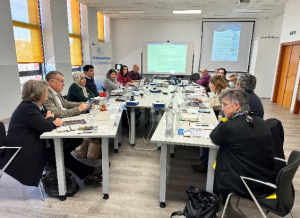
Figure SEQ Figura \* ARABIC 4. Work session num. 4.
First, Prof. Sara Balderas (UCA) took the floor to explain the conditions to apply for the Erasmus Mundus recognition, highlighting that the duration of the Master’s degree must be 120 ECTS, distributed in 4 semesters and that students must pass through two countries different from their country of origin to be eligible for the scholarship.
Regarding the accreditation process, the Spanish university system (which includes UCA and ULe) is fully aligned with ESG. In contrast, the Italian (UAQ) and the Slovak (UT) ones are only partially aligned. On the other hand, Tunisia (USO) does not to have currently a recognised quality assurance system.
According to Professors Carlo Cecati and Concettina Bruccella (UAQ), who took the floor, the University of L’Aquila is fully accredited, so the accreditation of the degree through this university would be valid and recognised for all EU member countries. For its part, the USO would have to accredit the degree nationally.
In this context, Prof. Nuria González Álvarez and Mr Rafael de Paz Urueña (ULe) took the floor. They explained the difficulties of access to an Erasmus Mundus designation and its accreditation, stating that they suggest starting with the master’s degree without funding and once it is up and running, apply for the Erasmus Mundus recognition. However, Prof. Gabriel Guerrero (UCA) stated that it is possible to request the Erasmus Mundus without being in operation since, according to the regulations of this process, nowhere expresses that it is easier this way.
After a brief discussion among the partners, it is agreed to take up again the focus of the degree and the accreditation strategy in Session 6.
After the previous work sessions, a visit is made to the Royal Pantheon of the Collegiate Church (Colegiata) of San Isidoro, the historical heritage of León.
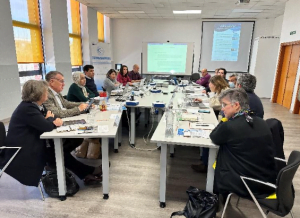
Figure 5. Visit the Royal Pantheon at the Collegiate Church of San Isidoro.
Wednesday, 1st February 2023 :
The last day begins with a visit (guided by each manager) to the supercomputing centre of the University of León (SCAYLE) and the Laboratory of Electrical Systems and Smart Grids, unique infrastructures related to the topic and that the University of León can make available to the project.
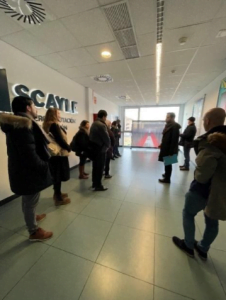
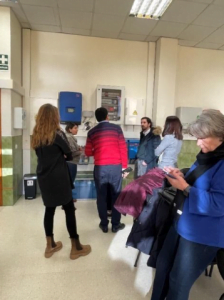
Finally, the last working session took place, led by Prof. Olfa Bel Hadj Brahim (USO) as project coordinator. First of all, all the actions to be carried out on the deliverables worked on in the previous day were reviewed.
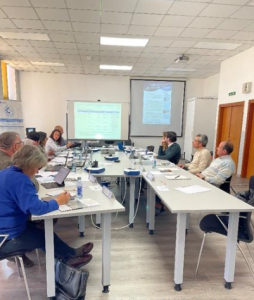
Next, the discussion was resumed on the general approach to the design of the master’s degree, which in turn will condition the design of the framework of competencies to be developed and the syllabus. To this end, Prof. Miguel de Simón Martín (ULe) presents the proposal prepared by the University of León in this regard, taking into account the conditions and characteristics of the degree. First, the general objective of the proposed master’s degree is defined:
“Give competencies to engineers and/or scientists to apply, in an efficient manner, Artificial Intelligence (AI) tools to the design, operation & maintenance of renewable energy systems integrated into power grids.”
The following are the preferred student’s entry profiles to the degree, distinguishing mainly 3:
- Graduates in Electrical / Mechanical /Energy /Electromechanical /Electromechanical / Electronics Engineering.
- Graduates of Computer Engineering Degree.
- Other scientific and technical degrees (Physics, Medicine, Economics, Law, etc.).
Based on the general objective of the master’s degree and the potential entry profiles, a general structure of the master’s degree in 4 academic semesters is proposed:
- Semester 1 (to be held at the University of Sousse): Compulsory semester in which the fundamentals of renewable energies and programming will be developed. At least 30 ECTS credits will be offered, whose objective is the levelling of students according to their entry profile so that they can face the rest of the semesters of the degree successfully.
- Semester 2 (to be held at the University of L’Aquila): Compulsory semester focused on the application of AI to power electronics and energy management (part I). At least 30 ECTS credits will be offered.
- Semester 3: Students could choose between two optional training itineraries:
- Track 1 (to be held at the University of Trnava): It will focus on a specialisation in the application of AI to analyse the impact of the ecological transition to health and the socio-economic analysis of renewable generation sources.
- Track 2 (to be held at the University of Cádiz and the University of León): It will focus on the application of AI to electrical power systems and advanced energy management. Students must take at least 15 ECTS credits in the two Spanish universities.
Semester 4 (to be held at any university of the consortium): Mandatory semester for internships either in the collaborating companies or university laboratories (according to the available offer) and the Master’s Thesis. It can be held in any of the universities of the consortium, with a maximum quota of students per university.
The proposal is summarised in Table 3.
Table 3 . Proposed general structure of the master’s degree.
* Minimum number of ECTS. Several optative blocks can be proposed (i.e. intensification on RES vs intensification on Programming).
** Internship: can be done both in a collaborating company or a research laboratory. An alternative offer of optional (specialisation) subjects can be made.
After an exchange of opinions, most partners agreed with the proposed structure, and it was decided that this matter should be dealt with at the next meeting in order to give each partner time to make the necessary consultations in order to check its feasibility.
Finally, Prof. Olfa Bel Hadj Brahim (USO) took the floor to thank everyone for their attendance and the work carried out during these three days.
The event closed at 13:30 h, being completed all the programmed activities.


